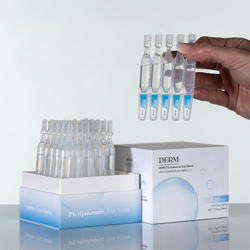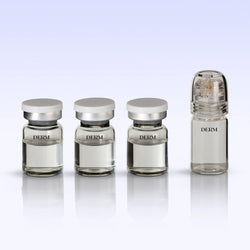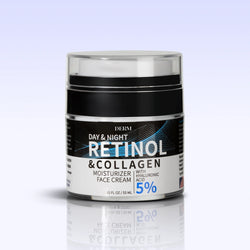The Science Behind Skin Hydration: More Than Just Drinking Water

Written by Our Editorial Team
6 MINUTES READ
If you've ever dealt with dry, dehydrated skin, you've probably heard the advice: "Just drink more water!"
While staying hydrated is important for overall health, the relationship between drinking water and skin hydration is more complex than you might think.
Let's dive into the real science behind keeping your skin hydrated and glowing.

Understanding Your Skin's Moisture Barrier
Your skin has a sophisticated natural moisture system called the moisture barrier or skin barrier. Think of it like a brick wall:
- The "bricks" are your skin cells
- The "mortar" is made up of lipids (natural oils)
- Together, they create a protective barrier that keeps moisture in and irritants out
As we age, this barrier becomes less effective at retaining moisture, leading to:
- Increased water loss through the skin
- Reduced natural oil production
- Compromised barrier function
- Slower cell turnover
The Hydration Process: Inside vs. Outside
While drinking water is essential for your body's overall hydration, research shows that the water you drink doesn't directly translate to skin hydration. Here's why:
Internal Hydration:
- Water you drink is processed by your kidneys first
- Other organs receive priority for hydration
- Your skin is actually the last organ to receive water from internal processes
Topical Hydration:
- Works directly where needed
- Can be enhanced with specific ingredients
- Provides immediate and targeted benefits
- Helps strengthen the moisture barrier
The Three Keys to Skin Hydration
1. Humectants These ingredients attract water to your skin. The star player? Hyaluronic acid (HA), especially at higher concentrations like 3%, which can hold up to 1000 times its weight in water.
2. Emollients These fill in the gaps between skin cells, creating a smoother surface and helping prevent moisture loss. Examples include:
- Squalane
- Ceramides
- Natural oils
3. Occlusives These create a protective seal over the skin, locking in moisture and other beneficial ingredients.
Why Concentration Matters
When it comes to hydrating ingredients, concentration makes a significant difference. For example:
- 1% hyaluronic acid: Basic hydration
- 2% hyaluronic acid: Improved moisture retention
- 3% hyaluronic acid: Optimal hydration with deeper penetration
Environmental Factors
Your skin's hydration levels are also affected by:
- Humidity levels
- Temperature
- Air conditioning
- Heating systems
- Sun exposure
Creating an Effective Hydration Strategy
For optimal skin hydration, consider this multi-layered approach:
1.Surface Level
- Use a gentle, non-stripping cleanser
- Apply hydrating products to damp skin
- Layer products from thinnest to thickest
2. Deep Hydration
- Use products with multiple molecular weights of hyaluronic acid
- Look for formulas with optimal concentrations (3% for HA)
- Include ingredients that support barrier function
3. Environmental Protection
- Use humidifiers in dry environments
- Protect skin from extreme temperatures
- Apply broad-spectrum sunscreen daily
Signs Your Skin Needs More Hydration
- Tightness after washing
- Increased sensitivity
- Fine lines appearing more pronounced
- Makeup settling into lines
- Dull, lackluster appearance

The Solution: Advanced Hydration Technology
Modern skincare science has evolved beyond simple moisturizers. The DERM™ 3% Hyaluronic Acid Serum represents this advancement, offering:
- Optimal 3% concentration for maximum effectiveness
- Multiple molecular weights for comprehensive hydration
- Supporting ingredients for barrier function
- Quick absorption for immediate results
- Long-lasting hydration throughout the day
Taking Action for Hydrated Skin





